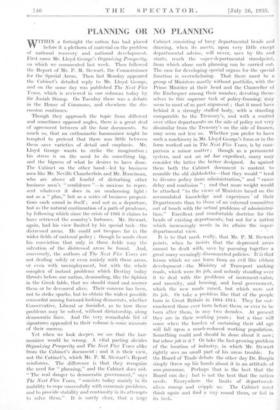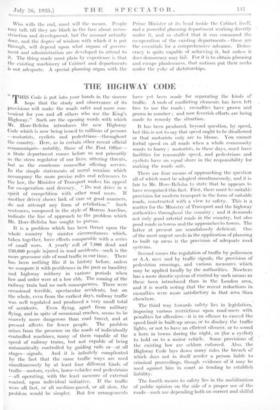PLANNING OR NO PLANNING
W'THIN a fortnight the nation has had placed before it a plethora of material on the problem of national recovery and national development. First came Mr. Lloyd George's Organizing Prosperity, on which we commented last week. Then followed the Report of Mr. P. M. Stewart, the Commissioner for the Special Areas. Then last Monday appeared the Cabinet's detailed reply to Mr. Lloyd George, and on the same day was published The Next' Five Years, which is reviewed in our columns today by Sir Josiah Stamp. On Tuesday there was a debate in the House of COmmOns, and elsewhere the dis- cussion continues.
Though they approach the topic from different and sometimes opposed angles, there is a great deal of agreement between all the four documents. So much so, that an enthusiastic. harmonizer might be tempted to pretend that there was little between them • save varieties of: detail and emphasis. Mr. Lloyd George wants to strike the imagination ; his stress is on the need to do something big, and the bigness - of what he desires to have done, The Cabinet on the other hand—led by business men like Mr. Neville Chamberlain and Mr. Runciman, who are above, all fearful of disturbing other business men's " confidence "-v-is anxious to reprer sent whatever it does in an unalarming light : not as a " plan,", but as a series of business proposi- tions each sound in itself ; and not as a departure, but as the natural continuation of a path of prudence, by following which since the crisis of 1981 it claims to have retrieved the country's fortunes. Mr. Stewart, again, had his view limited, by his special task--,the distressed areas. He could not trespass, far in, the wider fields of national policy ; though he made clear his conviction that, only. in :those . fields may the salvation of the distressed areas be found. And, conversely, the authors of. To Next Five Years are not. dealing . solely or even . mainly with those areas, or even with unemployment, but with the whole complex of instant problems which Destiny todi.y thrusts before our nation, demanding, like the Sphinx in :the Greek fable, that we should, stand and answer them or be devoured alive. Their concern has been, not to strike sparks, but to obtain the widest possible concordat among forward-looking democrats, whether Conservative, Liberal or Socialist, as to how theSe problems may be solVed, without dictatorship, along democratic lines. And the very reniarkable liSt of signatures appended to their volume is some .measure of their success;
Yet when we look deeper, we see that the har- m6nizer would be wrong. A vital parting divides Organizing Prosperity and The Next Five Years alike from the ,Cabinet's document ; and it is their view, not the Cabinet's, which Mr. P. M. Stewart's Report reinforces. The difference is that they recogniie the need for " planning," and the Cabinet does' not. " The real danger to democratic governniea," says The Next Five Years, " consists today mainly in its inability to cope successfully with economic problems, and to provide stability and continuity in its attempts to Solve them." It is Surely clear, that a large
Cabinet consisting of busy departmental heads and drawing, when its meets, upon very little except departmental advice, will never, save by fits and starts, reach the super-departmental standpoint, from which alone such planning can be carried out. The case for developing special organs for the special function is overwhelming. That there must be a group of Ministers mostly without portfolio, with the Prime Minister at their head and the Chancellor of the Exchequer among their number, devoting them- selves to-this snprerne task of policy-framing;
seem to most of us past arguinent ; that itirinst have behind it a strongly staffed body, withstanding comparable to the' Treasury's, and with a control over other departments on the side of policy not 'very dissimilar froM the Treasury's'on the side of finance, may seem not less so. Whether you prefer 'to have such a machinery in Mr. Lloyd George's form or in the
form worked 'out in The Next Five Years, is by cornparison a minor matter ; though as a peri-narient system, and not an ad hoc expedient, many may consider the latter the better designed. As 'against them both the' Cabinet document is content to Mumble the old shibboleths---•--that they would " tend. to divorce policy from administration," and ." cause delay and confasion " ; and that More weight would be attached "to the vie-Ws of Ministers based 'on the accumulated knowledge and, -experience of their Departments than to those of an external' committee out of touch with the actual problems of administra■- tion." Excellent and comfortable doctrine for the heads of existing departments,, but not for a nation which increasingly • needs in its affairS the • super=' departmental view.
It is to that need, really, that Mr. P: M..'SteWart points, when he insists that the depressed' area cannot be dealt' with, save by pursuing together a great many seemingly disconnected polieies.. It 1§ that lesson which we can learn from an evil 'like ribbon' development—the Ministry of TransPort -Making roads, which were its job, and nobody standing. over it to deal with the problems of increment-valtie; and amenity, and housing; and local goVermnent, which the new toads raised, but which were not its job. Or take a problem like that of the people. born in Great Britain in 1894-1914. They far out- numbered' those ever born before them; or 'ever to be born after them, in any two decades. At present they are in their working years ; but 'a time will come when the burden of sustaining their old age will fall upon a much-reduced working population. Something could and should be done about it now; but whose job is it ? Or take'the fast-growing Problem of the location of industry, in which' Mr. Stewart rightly sees no small part of hi's areas trouble.. In the Board of Trade debate the other day Dr. Burgin simply threw up his hands about it in an attitude of non-possumus. Perhaps that is the best that the Board can do ;. but is not the best that the nation needs.' Everywhere the limits of department- alism cramp and cripple us.• The Cabinet must think again and find a way round them, or' fail in its task.. Who wills the end, must will the means. People may talk till they are black in. the face. about recon- struction and development, but the amount actually done, and the degree of wisdom with which it is put through, will depend upon. what organs of govern- Ment and administration are developed to attend to it. The thing made most plain by experience is that the existing machinery of Cabinet and departments is not adequate. A special planning organ with the
Prime Minister at its head inside the Cabinet itself, and a powerful planning department working directly under it, and so staffed that it can command the co-operation of the existing departments—these are the essentials for a comprehensive advance: Deino- cracy is quite capable of achieving it, but unless it does democracy may fail. For it is to obtain planning and escape planlessness, that nations put their necks under the yoke of dictatorships.






































 Previous page
Previous page